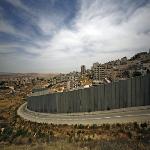May 27, 2011

Photo: Reuters
A section of the controversial Israeli barrier is seen from Jerusalem and shows the Shuafat refugee camp (R) in the West Bank near Jerusalem, and Pisgat Zeev (L) in an area Israel annexed to Jerusalem after capturing it in the 1967 Middle East war, May 25, 2011
A senior member of the Palestine Liberation Organization - Hanan Ashrawi - says the Arab Spring events of the past few months have had a major impact on the Middle East, including the reconciliation of the rival Palestinian groups, Fatah and Hamas. But, Israeli Prime Minister Benjamin Netanyahu told the U.S. Congress earlier this week that Israel will never talk peace with the Palestinians as long Hamas plays a leading role.
Political violence in Yemen. NATO airstrikes in Libya. Millions promised by the world's industrial giants for democratic change in the Middle East. All are elements of what's called the Arab Spring.
But there are no signs of spring between Israelis and Palestinians.
"Israel will not negotiate with a Palestinian government, backed by a Palestinian version of al-Qaida," said Netanyahu. He stressed to Congress there can be no peace talks if the militant Hamas group is part of the Palestinian leadership.
Yet that is what is needed, said Ashrawi, a senior member of the Palestine Liberation Organization. She said Palestinian unity demands that all groups be embraced in the government.
"Hamas belongs within this democratic pluralistic system, not as a substitute for it, or a replacement or an alternative," she said.
But any Hamas role is unacceptable to Israel. Jonathan Peled, spokesman for the Israeli embassy, said "Israel cannot be expected to sit down and negotiate with an organization that calls for its destruction."
In September, the United Nations General Assembly will consider a proposal to recognize Palestinian statehood. Ashrawi said that will lead to membership and its benefits within the international community.
"It means you get access - you have access to all the judicial accountability you need within the U.N. [United Nations] system," she said. "And then, you have the recognition that you do have boundaries."
Peled predicts the U.S. and other countries won't allow it. "To go through the United Nations for recognition, is not the correct path. I think that is the strongest message that is coming out of this last week's visit."
That, Ashrawi said, would be a mistake. "If you block us from the U.N., from getting accountability from Israel, from trying to get protection for Palestinians, by peaceful means, by non-violent means, then it seems to me you leave us with the option of violence, as the only thing that works."
If so, the Arab Spring holds little promise of thaw between Israelis and Palestinians.